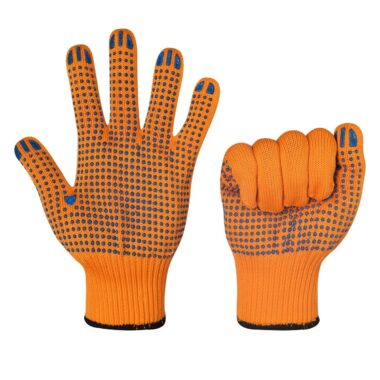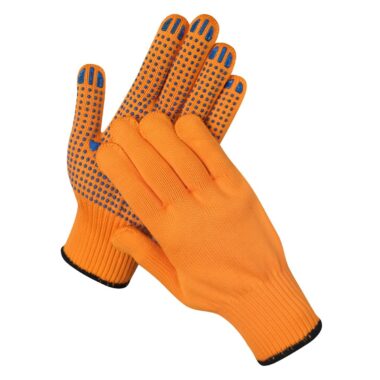Choosing the right material for your custom work gloves is a crucial step in ensuring your workforce’s safety and comfort. Whether your employees are handling tools, machinery, or hazardous substances, the material of the gloves can make all the difference. In this guide, we’ll walk you through the most popular materials used in custom work gloves, so you can make the best choice for your business.
1. Leather: Durability and Protection
Leather gloves are one of the most durable and popular choices for heavy-duty work. Leather is tough, abrasion-resistant, and provides excellent protection against cuts, punctures, and impacts. Ideal for industries like construction, mining, and welding, leather gloves can withstand rugged conditions and last longer than other materials.
-
Why Choose Leather: Leather gloves provide a perfect balance between comfort and protection. They are naturally breathable, reducing sweat buildup and ensuring comfort during long hours of use.
2. Nitrile-Coated: Oil and Chemical Resistance
For environments where workers are exposed to oils, chemicals, or solvents, nitrile-coated gloves are an excellent choice. Nitrile is resistant to many chemicals, offering superior protection for employees working with harsh substances. Additionally, nitrile-coated gloves provide a good grip and are puncture-resistant, making them ideal for industries such as manufacturing, automotive, and chemical handling.
-
Advantages of Nitrile Coating: Nitrile gloves offer excellent abrasion resistance, durability, and a better fit compared to traditional rubber gloves. They are also latex-free, making them suitable for workers with allergies.
3. Cut-Resistant Fibers: Safety in High-Risk Industries
Cut-resistant gloves are made from high-strength fibers such as HPPE (High-Performance Polyethylene), aramids, or steel wire. These gloves are specifically designed to protect workers from sharp objects like metal, glass, and machinery parts. If your workers handle materials with sharp edges or work in environments where cutting hazards are present, cut-resistant gloves are a must.
-
Why Use Cut-Resistant Gloves: These gloves provide excellent protection while allowing full flexibility and dexterity. They are commonly used in industries like construction, food processing, and glass handling.
4. Rubber and PVC: Water and Chemical Resistance
For industries where workers are exposed to wet conditions or chemicals, rubber and PVC gloves are a great option. These gloves offer waterproofing and chemical resistance, protecting hands from water, oils, and other harmful substances. They are commonly used in cleaning, agriculture, and food processing industries.
-
Benefits of Rubber and PVC: Rubber and PVC gloves are highly durable and easy to clean. They provide a secure fit, and their water resistance keeps hands dry and comfortable throughout the day.
5. Thermal and Insulated Materials: Protection in Extreme Temperatures
Thermal and insulated gloves are essential for workers exposed to extreme temperatures, whether hot or cold. These gloves are made from materials like neoprene, rubber, or fleece linings, which offer excellent insulation. If your workforce operates in cold storage, outdoor construction, or other extreme environments, insulated gloves can keep workers comfortable and safe.
-
When to Use Thermal Gloves: For workers in cold environments, thermal gloves provide warmth and protect against frostbite. On the other hand, high-heat environments can benefit from heat-resistant gloves that provide protection from burns and high temperatures.
6. Choosing the Right Material for Your Industry
Selecting the right material for your custom work gloves should be based on the specific hazards your workers face. Consider the tasks they perform, the environment they work in, and any special requirements for grip, comfort, or flexibility. As a work gloves manufacturer, we can help you choose the ideal material to match your business’s needs and ensure safety.
-
Industry-Specific Materials: For construction workers, leather or cut-resistant gloves may be most appropriate. For chemical handling, nitrile-coated gloves provide superior protection. Choose materials based on your industry’s demands.
Conclusion
Choosing the right material for custom work gloves is a crucial step in ensuring safety, comfort, and productivity in the workplace. Whether you need cut-resistant gloves for high-risk industries, nitrile-coated gloves for chemical handling, or thermal gloves for extreme temperatures, the material you choose should align with your workers’ needs. By selecting the right material, you are investing in your workforce’s safety and performance.





















